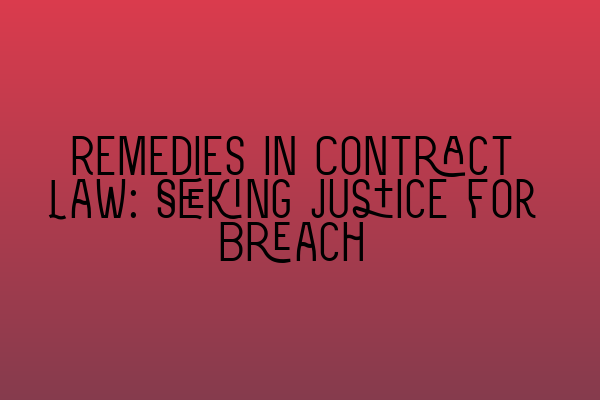Remedies in Contract Law: Seeking Justice for Breach
Welcome to SQE Contract Law, where we provide expert insights into various aspects of contract law. In this article, we will discuss the important topic of remedies in contract law and how they can help individuals seek justice for a breach of contract. Whether you are a business owner, professional, or individual entering into a contractual agreement, understanding the available remedies is essential for protecting your rights and interests.
What are Contract Remedies?
Contract remedies refer to the legal solutions available to parties when a breach of contract occurs. Breach of contract happens when one party fails to fulfill their obligations as outlined in the agreement. In such cases, the innocent party is entitled to seek remedies to address the harm caused by the breach and restore the parties to their pre-contract positions.
There are several types of contract remedies available depending on the nature and extent of the breach, including:
- 1. Damages
- 2. Specific Performance
- 3. Rescission and Restitution
- 4. Injunctions
Let’s delve into each of these remedies in detail:
1. Damages
Damages are the most common form of contract remedy, aiming to compensate the innocent party for the loss suffered as a result of the breach. There are two main types of damages:
- a) Compensatory Damages: These aim to put the innocent party in the position they would have been in if the breach had not occurred. This includes both foreseeable losses and any additional losses resulting from the breach.
- b) Consequential Damages: These are the indirect or special damages that may arise due to the breach. Consequential damages must be reasonably foreseeable and directly caused by the breach.
To better understand the concept of damages in contract law, you can read our article on Exploring the Impact of Frustration on Contractual Obligations: Legal Insights.
2. Specific Performance
Specific performance is a remedy that requires the breaching party to perform their contractual obligations as agreed upon. This remedy is typically available in cases where monetary compensation may not adequately address the harm caused by the breach. However, specific performance is often subject to the court’s discretion and may not be granted in every circumstance.
To gain a deeper understanding of how contractual clauses are interpreted, you may find our article on Interpreting Contractual Clauses: Unlocking the Hidden Meanings helpful.
3. Rescission and Restitution
Rescission and restitution allow the innocent party to seek the cancellation of the contract and the return of any consideration provided. This remedy is commonly used when the breach is so substantial that it undermines the fundamental basis of the contract. Rescission and restitution effectively put the parties back to their pre-contract positions.
If you’re interested in learning more about the key considerations for entrepreneurs when entering into business contracts, we recommend reading our article on Legal Aspects of Business Contracts: Key Considerations for Entrepreneurs.
4. Injunctions
Injunctions are a remedy that seeks to prevent a party from taking certain actions or to compel them to perform or cease a specific action. In contract law, this remedy is often used when monetary damages are insufficient to prevent irreparable harm or when there is a need to enforce specific obligations outside of the contractual performance.
For more information on the SQE Contract Law qualification and how it compares to traditional qualifications, check out our article on SQE Contract Law vs. Traditional Qualifications: A Comparative Analysis.
Understanding the various types of agreements in contract law can provide further clarity on the specifics of the remedies available. We recommend reading our article on Agreements in Contract Law: Understanding Its Various Types for a comprehensive overview.
In Conclusion
Remedies in contract law play a vital role in seeking justice and protecting the rights and interests of parties involved in contractual agreements. Whether it’s the awarding of damages, specific performance, rescission and restitution, or the use of injunctions, choosing the appropriate remedy requires careful consideration of the circumstances and the desired outcome.
At SQE Contract Law, we strive to provide comprehensive insights into contract law topics to help individuals and businesses navigate the complex world of contracts. If you require further assistance or legal advice regarding remedies in contract law, do not hesitate to get in touch with our team of experienced solicitors.
